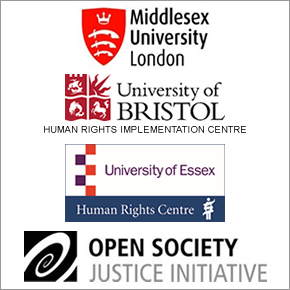An 'implementation crisis' is widely acknowledged to be afflicting regional and international human rights mechanisms posing a grave threat to their integrity and perceived legitimacy. Against this backdrop, regional and international bodies are pursuing efforts to strengthen their mechanisms for ensuring redress for victims of human rights violations and to ensure the swift and effective implementation of their decisions. This situation adds urgency to a debate which is long-established but remains unresolved: what does it mean to comply with international and regional human rights law and what factors influence whether States comply or not?
In order to explore this question in more detail, four leading academic human rights centres have come together in a unique partnership, funded by the Economic and Social Research Council (ESRC). These are the Human Rights Implementation Centre at Bristol University; the Human Rights Centre at the University of Essex; Middlesex University; and the Centre for Human Rights at the University of Pretoria. The Open Society Justice Initiative, part of the Open Society Foundations, will also serve as a partner organisation for the research, which will bring together policy makers, practitioners, and academics.
Aims and objectives
This is an ambitious three-year project that will aim to track up to five selected decisions by UN Treaty monitoring bodies and regional human rights bodies against nine countries in Europe, Africa and the Americas to see the extent to which States have complied with them, and why. In so doing, it will provide some of the broader answers to why States comply, as well as providing insights which can be used by pro-compliance actors. The project will run from September 2015 until September 2018.
The aim of this research is not to compare the performance of the different States, but rather to use the selected decisions as a lens through which to identify the role of the various actors, both domestic and international, in compliance. An examination of both regional and international decisions will provide an analysis of the extent to which there may be a difference in the discourse and behaviour of various domestic actors depending on which body issued the decision.
Accordingly, the research seeks to examine a number of fundamental questions namely:
- What does ‘compliance’ and ‘implementation’ with decisions and judgments mean in international human rights law?
- How far does the specificity/prescriptiveness of the remedies and/or the reasoning in the decisions/judgments affects the degree of compliance?
- Does the nature of the body issuing the decision/judgment and its perceived reputation impact on compliance?
- Do the types of violations or how they are framed by the relevant body affect levels of compliance?
- How do the mechanisms which monitor implementation interact with the domestic systems of compliance?
- To what extent is a ‘compliance coalition’ necessary for the implementation of decisions?
- What formal and informal processes exist in the process of compliance?
- How do international norms become appropriated and ‘internalised’ at the domestic level?
- To what extent does the social and political contentiousness of decisions/judgments influence the degree of compliance?
In addition to desk-based research, the project will involve a series of semi-structured interviews; participant observation; and stakeholder workshops. These activities will be aimed at examining implementation within the selected States both of decisions of UN treaty monitoring bodies and judgments and decisions of regional courts and commissions. It will look at case law, policies, practices and mechanisms established to respond to these findings as well as the opinions of key stakeholders.
It is anticipated that the findings of the project will contribute to a better understanding of the factors that influence compliance with decisions from the UN and regional human rights bodies, which can help inform and strengthen the strategies and working practices of these bodies, as well as actors engaging with them such as litigators and complainants, State representatives, and civil society organisations.
For more information about the project please contact:
- Professor Rachel Murray (Bristol)
Rachel.Murray@bristol.ac.uk - Debra Long (Bristol)
Debra.Long@bristol.ac.uk - Professor Frans Viljoen (Pretoria)
Frans.Viljoen@up.ac.za - Dr Alice Donald (Middlesex)
a.donald@mdx.ac.uk - Christian de Vos (Open Society Justice Initiative):
Christiandevos@opensocietyfoundations.org


